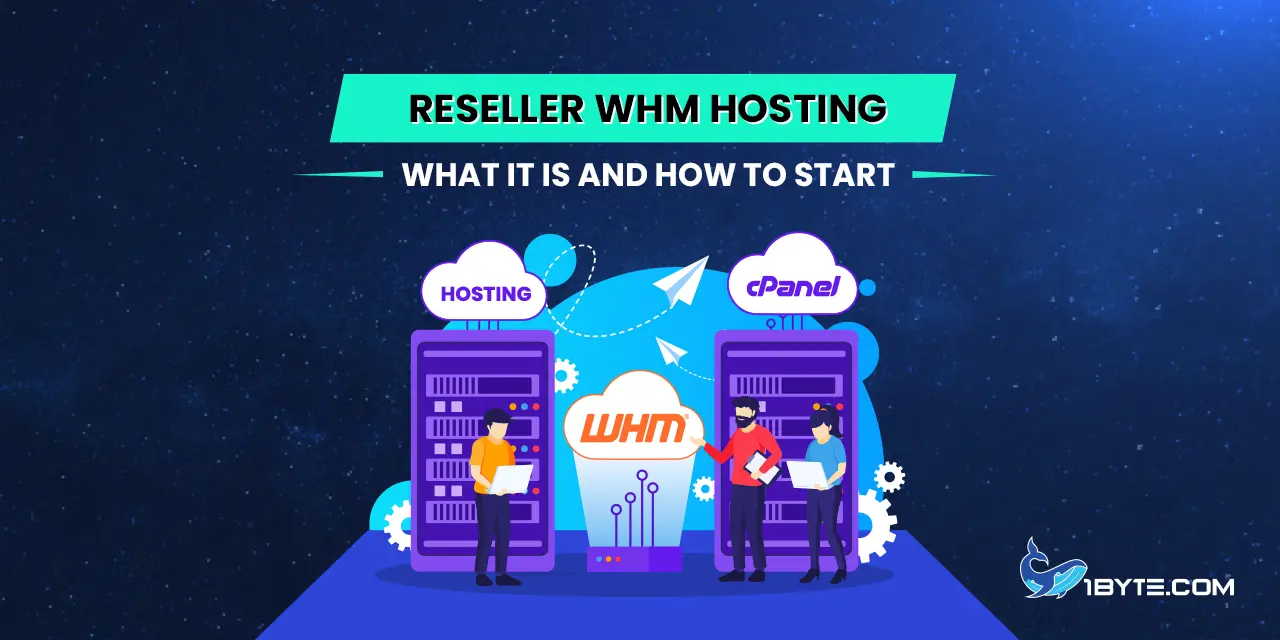Reseller WHM hosting lets entrepreneurs become web hosting providers by reselling cPanel accounts. In this model, you rent server space from a hosting company and parcel it out to your customers. Each customer gets a separate cPanel hosting account that you manage through WHM (Web Host Manager). WHM is the backend interface for cPanel that lets you create and manage multiple hosting accounts and set resource limits for each. For example, you can assign disk space, bandwidth, and email accounts to each client’s site. The hosting company handles the server hardware and network, so resellers avoid the technical burden of running a server.
In practice, reseller WHM hosting is like running a hosting business without owning the infrastructure. You simply purchase a reseller plan or a VPS with cPanel/WHM, and then set up your brand and packages. You can customize the control panel’s appearance with your logo and company name, making the service fully white-label. Clients see only your brand and not the original provider. In short, reseller hosting with WHM allows you to sell web hosting under your own name, using the proven cPanel platform
The web hosting industry is vast and growing. By early 2025, there were about 1.5 billion live websites worldwide. Many small businesses and individuals need affordable hosting. Reseller hosting taps into this demand: it lets designers, agencies, or entrepreneurs earn hosting revenue without big upfront costs.
How Reseller WHM Hosting Works

Reseller WHM hosting works by dividing hosting resources into multiple client accounts. You first obtain a reseller hosting plan or set up your own server with cPanel/WHM. On WHM, you create hosting packages (also called “plans” or “packages”) that define disk space, bandwidth, and other features. Then you use WHM to create individual cPanel accounts for each customer’s domain under those packages. Each customer logs into their own cPanel to manage their website, email, and files, while you manage the accounts from WHM.
The diagram below illustrates the flow:
- The hosting provider (or your VPS) runs cPanel/WHM on a server.
- As a reseller, you log into WHM (Web Host Manager) using your reseller account.
- In WHM, you use the “Create an Account” tool to assign a domain name to a new cPanel account.
- You set resource limits (disk, bandwidth, email) based on your predefined package.
- The new client receives login details to their cPanel and manages their site from there.
- You can create, suspend, or delete accounts at any time through WHM.
WHM provides many tools for resellers. It lets you brand the interface, set default pages, reset passwords, and monitor usage. For example, WHM’s Customization feature lets resellers upload a logo and set a company name in the cPanel interface. WHM also lets you manage DNS zones and IP addresses for each account. Crucially, WHM keeps each cPanel account isolated: “there is no way for someone to tell if accounts on different cPanels are attached to the same WHM account,” which enhances security and privacy.
Because reseller WHM hosting is just layered on top of standard hosting, resellers enjoy many benefits:
- Multiple Accounts, Single Platform: You get WHM’s dashboard to create unlimited cPanel accounts (limited only by your plan). Each client site runs independently, improving security and flexibility.
- Custom Branding: You can rebrand the hosting interface fully. WHM allows uploading a logo and setting your company name on all customer cPanels. This white-label feature helps present a professional image.
- Low Technical Overhead: The underlying server and OS are managed by the provider. You don’t need to configure or update the server yourself. You simply create accounts and monitor usage.
- Control over Resources: WHM lets you allocate resources per account. You can adjust disk or bandwidth and suspend accounts if limits are exceeded. This gives you control over costs.
- Additional Income Streams: Many resellers use WHMCS or similar tools to automate billing and support, turning hosting into recurring revenue. As one guide notes, reseller hosting “allows you to charge an overhead and gain an extra revenue stream”.
- Passive Income Potential: Resellers often buy hosting at wholesale rates (e.g. 20% off) and sell it at a markup, creating a passive income model.
Compared to ordinary shared hosting, reseller accounts give you separate cPanels for each client. A shared hosting plan normally provides one cPanel with unlimited sites but forbids reselling. A reseller account, by contrast, “is meant for one owner who wishes to resell hosting and essentially act as their own hosting company. Depending on the plan, you can have anywhere from 10 to 250 separate cPanel accounts”. In other words, your customers each get their own cPanel, rather than using sub-accounts under a single login.
FURTHER READING: |
| 1. Top 5 Web Hosting Providers for Unlimited Bandwidth in 2025 |
| 2. Ecommerce Web Hosting Comparison: A Detailed Guide for 2025 |
| 3. Web Hosting Philippines: Top 10 Providers for 2025 |
Benefits of Reseller WHM Hosting
Reseller WHM hosting is popular for its ease and flexibility. Key benefits include:
- Simple Startup: You avoid large capital expenses. There is no need to purchase servers or datacenter space. A basic reseller plan costs a few dollars a month, yet you can sell hosting under your own brand.
- Built-in Tools: Reseller plans usually include management tools. For instance, Namecheap’s plans come with WHMCS billing software and a free site builder. These tools help you invoice customers and even upsell domain registration or SSL certificates.
- Scalable Growth: You can start small and grow. If your clients need more resources, you can upgrade your plan or move to a larger VPS. WHM lets you resize accounts without downtime. This means you only pay for what you need.
- Branding and Privacy: Custom branding in WHM gives your company visibility, while clients see only your logos and support info. It keeps your business front and center.
- Targeted Services: Reseller hosting allows niche marketing. Many resellers focus on serving web designers, marketing agencies, or local businesses. You can package hosting with web design or digital marketing services to add value.
In short, reseller WHM hosting gives you the business tools of a big host without the complexity of system administration. The provider handles patching, firewalls, and hardware failures. You focus on sales, support, and growth.
How to Get Started with Reseller WHM Hosting

Getting started is straightforward if you follow a plan. Below are key steps to launch your reseller hosting business:
- Identify Your Niche. Decide who you will serve (web designers, bloggers, small businesses, etc.). Understanding your audience lets you tailor your plans and marketing. For instance, a WordPress agency might offer reseller hosting optimized for WordPress sites.
- Research and Select a Hosting Provider. Look for a reputable host that offers reseller or VPS plans with cPanel/WHM. Consider reliability, data center locations (preferably close to your target market), and whether they include WHMCS or a cPanel license. Some hosts like 1Byte even offer multiple data center regions.
- Set Up Your Infrastructure. If you buy a reseller plan, your hosting company will give you WHM access out of the box. If you set up your own VPS/dedicated server, install cPanel/WHM and obtain a license (cPanel Solo starts at about $26.99/mo for one account, scaling up to $65.99/mo for 100 accounts). Next, configure your nameservers (e.g. ns1.yourdomain, ns2.yourdomain) and DNS settings, so that new client sites point to your server. Most hosts have guides on setting up nameservers. Also configure email relay or outbound limits per client to avoid spam issues.
- Create Hosting Packages. In WHM, use the Package or Add a Package feature to define the resources you will sell. For example, you might create a “Basic” package with 5 GB disk and 50 GB bandwidth, and a “Pro” package with 15 GB and 150 GB. Namecheap’s reseller tiers illustrate typical offerings: one plan provides 30 GB SSD storage and 25 cPanel accounts, another 90 GB for 100 accounts, and so on. Include other perks like SSL or domain parking if possible.
- Set Pricing and Branding. Decide your pricing so you earn a profit on the margin. Remember to charge more than your cost to the provider. Market research helps: see what competitors charge, and consider promotions. Use WHM’s Customization feature to set your company name, logo, and help links in the cPanel interface. This way, every client cPanel shows your branding. Also, set up a billing solution like WHMCS or Blesta to automate invoicing and account provisioning. Many reseller plans include free WHMCS modules.
- Launch and Promote Your Service. Build a simple website advertising your hosting packages. Highlight key features: your local data centers (if applicable), uptime guarantees, 24/7 support, and the fact that clients get their own cPanel. Use testimonials if you have them. Promote via social media, online communities, or direct outreach.
- Support Your Clients. Provide reliable customer service. Offer tutorials or live chat. As you grow, consider adding value-added services (domain registration, web design, SEO) that complement hosting. A satisfied customer is likely to renew and even refer others through affiliate programs (some hosts offer referral bonuses).
By following these steps, you can launch your reseller hosting business effectively. Each step involves active management: for example, WHM gives you real-time control to adjust packages and support tickets.
Choosing the Best Hosting Options
It’s important to understand how reseller hosting compares to other models before you start:
| Hosting Type | Who Manages Server | Accounts per Login | Use Case | Example Providers |
| Shared Hosting | Provider | 1 (multiple domains via add-ons) | Single user or small site owners | Bluehost, SiteGround |
| Reseller Hosting | Provider | Many (10–250+) | Entrepreneurs or agencies selling hosting | Namecheap, HostGator, 1Byte |
| VPS Hosting | Provider (you choose virtualization) | Depends (you manage each VPS) | Users needing dedicated resources & root access | DigitalOcean, AWS Lightsail |
| Dedicated Hosting | You or provider (if managed) | 1 per server | Large clients or advanced resellers with full control | Liquid Web, OVH |
Reseller hosting stands out because it does not give you root access to the server (as a VPS or dedicated plan would). Instead, you get WHM-level access with limited server control (for security). This is fine for most resellers, since the provider secures and maintains the server. By contrast, a VPS offers you full control of a virtual server instance, but it also requires technical know-how (or higher fees for managed support). If you want maximum ease, a managed reseller plan is usually simpler than a VPS.
In terms of cost, reseller hosting is typically more expensive than basic shared hosting (since you’re getting multiple accounts and WHM features) but far cheaper than renting a dedicated server or enterprise cloud. For example, Namecheap’s Nebula reseller plan is $19.88/month, whereas a comparably powerful VPS or dedicated server would cost much more. Reseller hosting strikes a balance: you pay for the multi-account setup and support, but save on hardware and management overhead.
Reseller WHM Hosting vs Other Hosting Options
It helps to compare reseller hosting with other common options:
- Shared vs Reseller: A shared hosting account typically gives one user a single cPanel (with unlimited domains via sub-accounts)=. You cannot resell it. Reseller hosting gives you multiple cPanels to sell and manage under your brand.
- VPS vs Reseller: A VPS (Virtual Private Server) gives you root access and full control of a virtual server. You could technically rebrand it and create accounts, but that requires manual setup or expensive control panel licenses. Reseller hosting automates that with WHM/WHMCS built-in, and usually costs less. A reseller account avoids the need to manage the OS or security patches yourself.
- Dedicated vs Reseller: A dedicated server is yours exclusively. It’s best for very large clients or those needing extreme performance. It’s expensive and requires technical skills. Reseller hosting uses shared hardware behind the scenes, making it far cheaper.
For most small businesses and web agencies, reseller WHM hosting is preferred because it delivers ample features with low hassle. As one expert notes, “reseller packages are a preferred choice if you plan to sell some web hosting yourself,” since “the combination of cPanel and WHMCS has it all” for managing customers.
1Byte’s Reseller Hosting and Cloud Services
At 1Byte, we lead the way for reseller WHM hosting and cloud services. From our international, modern data centers, we deliver fast, reliable service with industry-leading uptime. In fact, our facilities boast up to 99.99% uptime, ensuring customer sites stay online.
We offer comprehensive reseller hosting plans built on cPanel/WHM. As a reseller with 1Byte, you get full WHM access to create and manage multiple cPanel accounts. You can customize each account’s package and brand the control panel to match your own company’s look. We even provide tools like the WHMCS billing platform and white-label marketing materials, so you can launch your hosting business quickly. Our multilingual support team is available 24/7, helping you and your customers at any time of day.
Our Infrastructure
Beyond reseller hosting, 1Byte’s infrastructure spans cloud servers, shared hosting, WordPress hosting, and more. We are also an official AWS Partner, enabling us to assist businesses in migrating to Amazon Web Services. In fact, within our first year we were recognized as an AWS Select Tier Services Partner. This means we meet high standards for cloud expertise and can resell AWS products to help companies scale. Our partnerships and awards reflect our commitment: we invest heavily in secure hardware and ongoing innovation to keep you competitive.

Over the years, we have helped many resellers and agencies worldwide grow their businesses. Our customers benefit from our affordable pricing, combined with enterprise-grade performance. For example, agencies often rely on us to host multiple client sites on one server, using WHM to control resources. We even support private and anonymous nameservers, multiple SSLs, and additional IPs – features that give resellers maximum flexibility.
We take pride in our achievements and our team. By working with us, resellers gain a partner that understands you. We know that trust and reliability matter, so we focus on delivering the best customer experience. As one of the pioneers in web hosting, 1Byte continues to expand.
Whether you are just starting or looking to upgrade from another host, 1Byte is ready to support your reseller WHM hosting venture. We offer free trials, easy migrations, and promotional rates to make the switch smooth. With our robust cloud infrastructure and reseller tools, you can confidently build your hosting business.
Leverage 1Byte’s strong cloud computing expertise to boost your business in a big way
1Byte provides complete domain registration services that include dedicated support staff, educated customer care, reasonable costs, as well as a domain price search tool.
Elevate your online security with 1Byte's SSL Service. Unparalleled protection, seamless integration, and peace of mind for your digital journey.
No matter the cloud server package you pick, you can rely on 1Byte for dependability, privacy, security, and a stress-free experience that is essential for successful businesses.
Choosing us as your shared hosting provider allows you to get excellent value for your money while enjoying the same level of quality and functionality as more expensive options.
Through highly flexible programs, 1Byte's cutting-edge cloud hosting gives great solutions to small and medium-sized businesses faster, more securely, and at reduced costs.
Stay ahead of the competition with 1Byte's innovative WordPress hosting services. Our feature-rich plans and unmatched reliability ensure your website stands out and delivers an unforgettable user experience.
As an official AWS Partner, one of our primary responsibilities is to assist businesses in modernizing their operations and make the most of their journeys to the cloud with AWS.
Conclusion
Reseller WHM hosting is an efficient way to start your own web hosting business. It combines low startup costs with powerful tools like WHM and WHMCS. By renting server space and using cPanel/WHM, you can create branded hosting packages for clients, manage multiple sites easily, and generate recurring revenue. The key steps are to choose a reliable provider, set up your packages and branding in WHM, and market your services to your niche.

